Friday, September 30, 2005
Wednesday, September 28, 2005
Something Wonderful This Way Comes
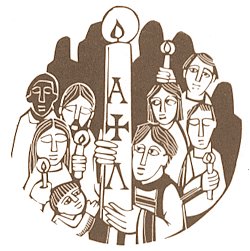
With thanks to Brother Steve Erspamer
It is one of my favorite moments in the service.
I enter the great church and find my rigid wooden pew, bowing and sliding in where I wait quietly, meditatively, prayerfully for the Holy Eucharist to begin. When it does, it is not with a voice from the pulpit, but with a crescendo of honeyed melody and dulcet harmony.
The music moves through the great hall of Grace & St. Stephen’s cathedral like something alive, like smoke. It dances among the images on the magnificent Quire stained glass, made luminescent by the soft fall light outside. It scales the sides of the great stone walls, licking at the vaulted trusses and beams that support the great wooden roof. It creeps down the Nave and swirls around my feet. I hear it, inhale it through my nostrils and feel it ever so gently caress my skin. As the choir lends their voices to the pipe organ, at once thunderous and hushed, it is like something out of medieval memory, like a passageway through time has been opened and for a moment, the sounds of an ancient faith pour through.
The clergy enter, following a choral procession that winds its way around the circumference of the structure, through the Nave and up onto the Chancel where all take their place.
But not before passing where I sit.
And for a moment—just a moment—I am a member of the choir.
As they snake their way past me, my voice blends with theirs and I find my chest swelling, my volume rising, my voice clearer. I lose my individuality and for the briefest of moments, become a part of something larger, more perfect, and more beautiful than I could ever be on my own. My voice disappears in a sea of perfect unison where the discord created by inadequate, though striving voices is replaced by unspoiled harmony.
Life is a lot like that, I think.
You want to be a better person, live a more perfect and righteous life, be a better husband, citizen, man, child of God—then surround yourself with others who are ahead of you on the serpentine pathways of life. Allow their wisdom, their acumen, their insights to inspire and guide your steps. Spend time in their company or in the company of their thoughts and allow your mind, your heart, your efforts to meld with theirs. Be immersed. Allow your selfishness and narcissism to be swallowed by something greater and more powerful than yourself.
It is astonishing how much stronger is my resolve, how much more muscular my faith, how much more focused is my goal when I purposefully set out to walk in the footsteps of the beautiful minds and elegant hearts of more mature saints, buttressed by the very proximity of my soul to theirs.
These days, I think about that every time the choir brushes past me. Every time ill-fitting metaphor brushes past enlightenment and enlightenment brushes past revelation and revelation brushes past action and action brushes past the very will and heart of God.
Why do I sing? I sing because I hear God singing.
Thursday, September 15, 2005
Pictures of Grace
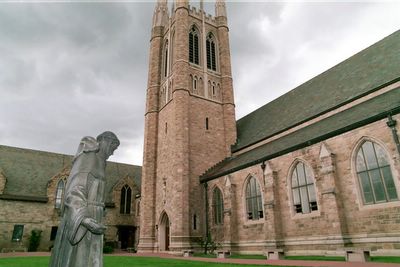
A year or so ago, my wife and I began attending Grace and St. Stephen's Episcopal Church, our first experience in the world of Anglican worship. I have found it to be a generous, enlarging and breathtaking experience, one unequaled in my adult Christian life.
This metamorphosis, not only of soul but of liturgy (celebrating the traditional Anglican Eucharist is a far cry from my Pentecostal upbringing) has inspired a handful of blogs already. Depending on your viewpoint, you'll be happy or horrified to discover that many more are on the way.
On a tangential note, click on the above title to go to Grace's website. A vast majority of the pictures seen there, primarily in the slideshow at the bottom of the homepage, are mine—a photographic addict's compulsion to record in hue and shade the very images and portraits that so color the walls of his heart.
Robert Wise, Dead at 91
Robert Wise, the editor of the masterpeice, "Citizen Kane" and the director of such memorable films as "The Sound of Music," "West Side Story," "The Day the Earth Stood Still" and, of course, "Star Trek: The Motion Picture" has died of heart failure. He was 91.
Friday, September 09, 2005
Telluride Film Festival or Bust!
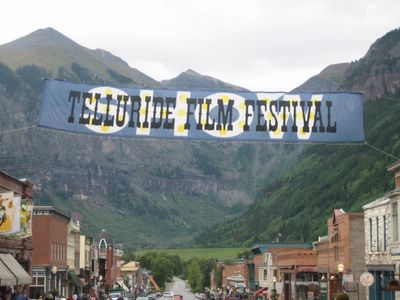
When my wife first suggested that we go to the Telluride Film Festival for our first anniversary, I turned her down flat.
“There is no way,” I said, “that we’re going to a film festival. It’s our anniversary…our first one at that. We are supposed to concentrate on one another. If I’m at a film festival I’ll be immersed in the films. As fun as it sounds, no way!”
But my wife is nothing if not persuasive and as the months and weeks went by, she continued to suggest Telluride as our vacation destination, whittling down my resolve. Now, it’s not that she is a tremendous film fan, wanting to spend her long weekend huddled in a dark theater. That’s me. But she rightly knew it was something I’d adore and wanted to make our first anniversary not only something intimate and special, but memorable as well. I still resisted for sometime until finally, convinced that she was o.k. with the idea, I relented. Once we were actually making concrete plans to attend, I, of course, began to get terrifically excited.
The Telluride Film Festival is known as the crown jewel of the nearly 2000 annual film festivals in this country. “It’s as if Cannes died and went to heaven,” says film critic and yearly attendee, Roger Ebert. High in the San Juan Mountains of southwest Colorado, nestled in box canyon embraced by a monolithic rock amphitheater, the Telluride Film Festival is four days of movie-going heaven. This is not a place where high-stakes deals are made and stars duck into to over-priced shops to avoid exasperating paparazzi. This is a place where one is just as likely to sit at a table across from a movie star or filmmaker at dinner as one is to find oneself standing beside them in line, waiting for a film to begin. The casual, relaxed Colorado lifestyle is king and it has bred an atmosphere of intimacy and informality that makes it a welcome breath of fresh air for the attending professionals bogged down by a much faster pace of life.
Unlike other film festivals, Telluride doesn’t announce its program in advance, preferring to let the films, rather than their publicity machines, take center stage. Films from around the world, new and old—many that you couldn’t see anywhere else and may never see again—are shown in outdoor parks, opera houses, lodges, theatres, and sumptuously converted school spaces.
Stephanie and I drove up Friday morning, giggling euphorically to 14 CDs worth of essayist David Sedaris who would be our constant companion each time we stepped foot in the car on the trip. We dropped off our stuff at a KOA cabin in Ouray which we would be using as our base camp for the trip and headed for Telluride for the early evening festivities. Arriving at the massive headquarters tent, we quickly snatched up a schedule and devoured it.
Individual pass-holder tickets begin around $350 and go up to several thousand! We were festival goers on the cheep. We quickly identified those shows and lectures that were free, bought a limited, special pass that got us into all the of the festival’s midnight showings (quite an obligation when your campsite is an hour away!) and chose those films for which we were willing to stand in line for over an hour—the majority of the films—with the pass-holders, admitted for a $20 ticket only after they had been let in and there was still room.
For the first show of the first evening, we went with a classic. Film critic Leonard Maltin gave a brief introduction and history before the lights dimmed and the screen burned with a newly restored print of the original King Kong. Certainly hokey at times, the over 70 year old film that has inspired this Christmas’ Peter Jackson remake is still startlingly good and technically brilliant.

Leonard Maltin
Leaving the small theater at the conclusion of the film, the dark night and the bitter cold reminded us that fall comes earlier at 9,000 feet. And here I was, still in shorts and a t-shirt. While it would rain the entire weekend, regular festival goers didn’t seem to mind—in past years, they mused, it’s snowed!
The midnight movies were held at the local high school’s theatre auditorium. The film was Edmond adapted from the David Mamet play by the same name. While waiting for the show to begin, I glanced over and recognized William H. Macy (Fargo, Magnolia, Seabiscuit, Pleasantville) the film’s star, sitting a few seats over. I quickly went over and introduced myself. The film is an exceptionally brutal and dark comedy about a white-collar guy who decides to leave his posh but listless life behind and instead live honestly and authentically with his fellow man. Unfortunately, the world is not ready for such a soul and, it seems, neither is the man in possession of it. Bloody tragedy is the result.
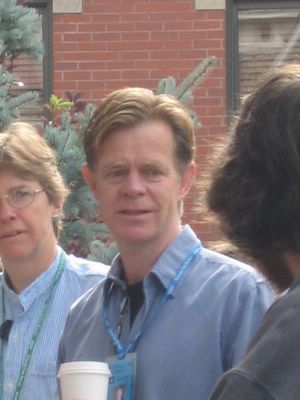
William H. Macy
Saturday, we decided to start the day taking in a Q&A conversation with Leonard Maltin and Andy Garcia (The Godfather III, The Untouchables, When a Man Loves a Woman, Ocean’s 11) about Garcia’s directorial debut in The Lost City about a Havana night club owner caught in the middle of the Marxist takeover of Cuba. The conversation was informative and fascinating, even though I think I was the only one attending you didn't cheer when Garcia said he and others are trying to convince Francis Ford Coppola to make a fourth Godfather movie. What’s the matter with these people!?
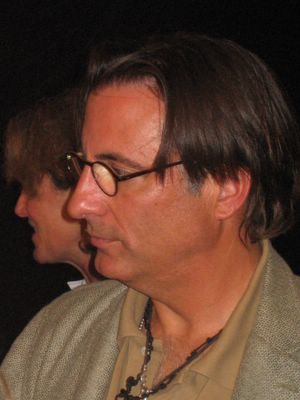
Andy Garcia
Next on Saturday was Brokeback Mountain, a film which showed for the first time Friday night but whose screening was delayed by an hour after the Venice Film Festival, running concurrently, called to ask that it be bumped back so that the film could have its world premiere in Venice. Directed by Ang Lee (Sense and Sensibility, Crouching Tiger, Hidden Dragon) the ravishingly gorgeous film is about two rugged cowboys, Heath Ledger (A Knight’s Tale, Monster’s Ball) and Jake Gyllenhaal (October Sky, Donnie Darko) who fall in love…with each other.
The final film of the day was the one I was the most excited about at the festival, Everything is Illuminated. The film marks the directorial debut of Liev Schreiber (Scream, RKO 281, The Manchurian Candidate), an actor whom, I think, is a titanic talent. Needless to say, when I saw him hiding in the shadows at the back of the theater, I had to meet him. As uproarious as it is heartbreaking, Everything is Illuminated, adapted from Jonathan Safran Foer’s prize-winning novel and starring The Lord of the Ring’s Elijah Wood is a quixotic, melancholy and quirky film about a young Jewish man’s search to discover how his grandfather survived the Nazi scourge in the Ukraine. But as the film unfolds, we learn that Wood’s search is merely a MacGuffin of sorts—the real reckonings and revelations lie with those he meets in the midst of his search. Easily one of the best films of the year and certainly my favorite film since this summer’s staggering, Crash.
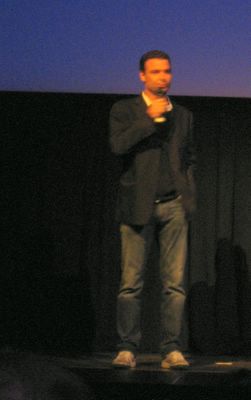
Leiv Schreiber
Stephanie and I thought that we’d lead off on Sunday with a Q&A conversation again. It was not to be. It seems everyone was eager to get in on a conversation between William H. Macy and Phillip Seymour Hoffman (Boogie Nights, Magnolia, The Big Lebowski, Cold Mountain) and the majority of them were pass-holders. Still it wasn’t a total loss. We were still able to see Hoffman as well as documentary filmmaker Ken Burns (The Civil War, Baseball, Jazz) while we waited in line.

Phillip Seymour Hoffman

Ken Burns
While it would have been an engrossing conversation, it allowed us ample time to get in line early for a lecture by writer and director, Peter Bogdanovich (The Last Picture Show, Paper Moon). Clad in a dress shirt complete with flowing cravat, Bogdanovich regaled the crowd to stories of his time spent with such legendary actors and directors as Alfred Hitchcock, Cary Grant, John Ford, Howard Hawks and Orson Wells. His inimitable wit and his spot-on impersonations made for one of the festival’s most delicious treats. I later had a conversation with him about the actor’s personality vs. their persona at a coffee shop while he signed a copy of his latest book.
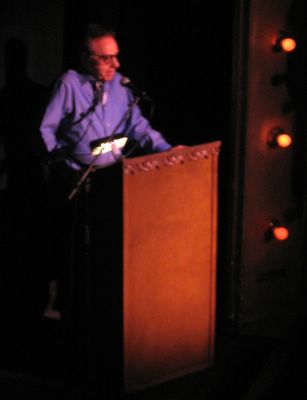
Peter Bogdanovich
Our next attempt was to see Paradise Now, a film we have wanted to see for some time, about two Palestinian suicide bombers who plan on attacking an Israeli bus but begin having second thoughts. Obviously we weren't the only ones who thought it looked extraordinary. We never had a chance of making it into this one. But the gondola ride up to the Telluride ski village where the film was being screened sure was beautiful.
We decided to use the time to celebrate our anniversary day with dinner at a fine Italian restaurant, buzzing with Italian accents and bottles of wine priced in the thousands (we ordered a significantly cheaper bottle!) Though we spent much of the dinner huddled beneath a table umbrella to stay dry from a thundering rain storm that snuck up on us in the middle of our meal, it was a wonderful time together and a nice break from the hurry-and-wait attitude of the festival weekend.
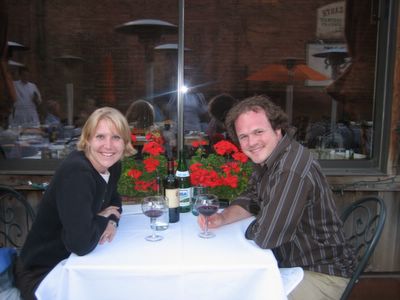
More Famous People!--Stephanie and Brandon
After the rain cleared, we saw Phillip Seymour Hoffman’s new film, Capote about the life of writer and socialite, Truman Capote. Sure to generate lots of Oscar buzz, this elegant and sumptuously made film focuses on the monstrously self-absorbed Capote’s writing of “In Cold Blood” about the brutal slayings of a Kansas farm family and the author’s subsequent years-long tortured relationship with their murderers. Very, very good.
I wish I could say the same for Sunday’s midnight movie, Bee Season based on Myla Goldberg’s novel. While a husband (Richard Gere of Pretty Woman, Primal Fear and Chicago) avoids his collapsing marriage by immersing himself in his 11 year-old daughter's quest to become a spelling bee champion, his wife (Juliette Binoche of The English Patient and Chocolat) begins a downward emotional spiral towards madness. It sounds like a perfectly acceptable story and the trailer seems to present a fascinating and idiosyncratic film about family love and hardship. Don’t let it fool you. Once you throw in some heavy-handed Kabalan preaching, a hotel exorcism, an inexplicable plummet towards insanity and an unbelievable experimentation with Eastern mysticism, you have a very beautiful and well-acted film that is nonetheless muddled and absolutely incoherent. This is the sort of film that had numerous story threads that should never have been intertwined. I spell this movie W-E-I-R-D.
The final day of the festival, Monday, we once again attempted to see Paradise Now. Once again, we were turned away. Scurrying to another theater, be made it into Iron Island an Iranian film dealing in metaphor with the totalitarian oppression of the religious regime and the brave but ultimately doomed defiance of the young.
Stuck with the prospect of a schedule listing a battery of films we’d already seen, we choose to attend “Great Expectations” next. No, it wasn’t a filmic adaptation of the Charles Dickens novel, but rather a series of four short films from up-and-coming young directors. Hosted by experimental filmmaker Godfrey Reggio (of the Qatsi trilogy—see my June blog, Frankenstein's Monster), this session yielded my absolute favorite film of the festival, Rain is Falling.
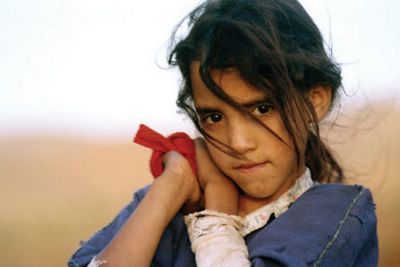
Filmed on location in Morocco, Rain is Falling is suffused with luxurious images which contain an almost mystic message that comes across perfectly and precisely without any dialogue whatsoever. A young, beautiful girl who acts with an almost eerie serenity, must protect her terribly ill mother from a torrential downpour which threatens to seep in from every nook and cranny of their mud and timber roof. It is an inspiring vision of selflessness in an overwhelmingly difficult situation. The director, German Holger Ernst writes, “The devotedness and elementary relationship of love and humanity lifts up the most simple action to redemption. Intuitive images weave themselves into a poetic narrative structure. Slowness and atmosphere build up to a cinematic climax, that uncovers the small, the beauty of the simple and natural, that may bridge human as well as cultural gaps.” Haunting and utterly masterful. You will probably never have a chance to see this short film and I assure you, your life is the poorer for it.
After “Great Expectations,” Stephanie and I attempted to get into Paradise Now one last time and while the admittance line ended with Stephanie, they refused to accept me. She gave her ticket to the next, exuberant guy in line and we made our way back to our tiny, cozy cabin.
The festival over, we decided to take one last vacation day on Tuesday, driving the Million Dollar Highway between Ouray and Silverton, made famous both for its million dollar views and the sliced-up hillsides, still peppered with ancient gold and silver mines. We made it home Tuesday evening after dark and were greeted exuberantly by our lonely cat, Cleopatra.
What a wonderful anniversary.
While worried that I would see little of my wife on this trip, we never left each others’ side, and filled the countless hours waiting in line for movies with talk of the astonishing rapidity of the past year and our dreams for the future. The same conversations spilled out of the numerous charming eateries we discovered between films, or rolled down the streets where we strolled hand in hand, or were whispered as we fell asleep in one another’s arms each night to the sound of a laughing brook outside our quaint cabin’s door.
What an wonderful woman.
While she possesses character qualities that so often astonish me and take my breath away, she can also do something as selfless and inspired—tiny in comparison to, say, her wide empathy and lavish grace for the hurting people in our lives, but no less real—as to suggest that we spend our first anniversary bathed in the phosphorescent glow of movie house light, just because it would make me happy and that would, in turn, make her happy.
Happy Anniversary, sweetheart. Thank you for treating this cinephile to a wonderful weekend and memories. I am honored to be your husband.
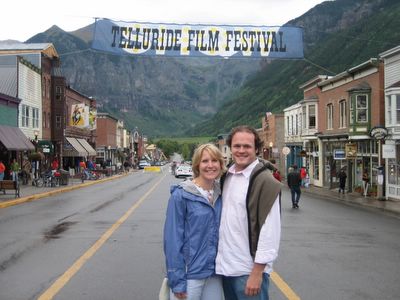
Hurricane Katrina: The Wrath of God?

The other day, a friend forwarded me an e-mail that has been circulating recently in which some group calling themselves both Christians and prophets claimed that the havoc wreaked by Hurricane Katrina is the hand of God smiting all the sinners and degenerates in New Orleans. Any time there is some sort of national or global tragedy, we can count on some fringe group (and, I am sad to admit, far too many in the mainstream) who will proclaim, as fact, that God's vengeful fist could be seen in the calamity. They said it about AIDS. They said it over 9/11. They said it during last year's Tsunami. And they are saying it again now.
I really wish these people would shut the hell up! They can keep their divinations, hallucinations and delusions. Prophets, indeed! Christians, indeed!
I think it is phenomenally dangerous, borderlining on, if not radically crossing, the line of blasphemy to both think we can presumptuously ascertain the mind, will and hand of God and worse, take tragedy and spin it for our own ignorant spiritual whims. Even if one should think that God's wrath may lie in a natural disaster, disease or some other such misfortune (the Scriptures prove He has used such tragedies to both punish wayward humanity and get its attention), one should hold one's tongue for fear that one not have the first clue of where God's hand lies (without the aforementioned Scriptural illumination).
We obviously see with different eyes, these sadists and I. I see a catastrophic natural disaster, possibly the worst in American history, whose rank waters are washing away all of our denials about how many of our fellow citizens are living in poverty as well as our reluctance to admit the now glaringly obvious connection between race and poverty in America. One look at who has suffered the most, who could not afford to evacuate, who was left behind waiting in vain for help and who will chart the most difficult course on the road to recovery and all sanctimonious illusions fall away. The faces on our news every night are overwhelmingly poor and black—the faces of an invisible and mostly silent poverty that we have willfully chosen not to talk about, let alone take responsibility for in the richest nation on the planet. But this disaster stripped us of our illusions and our walls. We cannot claim ignorance any longer.
Christ called upon all Christians to care for the sick, the needy, the poor, and the destitute among us. Christ told us that when we care for these devastated souls, we are actually caring for Him. And yet, some prefer to ignore the very tenets of their religion, preferring to play God themselves and stand in judgment over His creation. These people who claim to know the mind of God and see His handiwork in carnage should be ashamed of themselves. What right have they to take pleasure in the agony of others and hypocritically cloak it in sanctimonious piety? It is disgusting. It is the sort of faux Christianity I despise and want nothing to do with. I'd sooner have grace for the sinners they loath then these supposed believers who use the name of Jesus Christ as a weapon of hate and revulsion.

